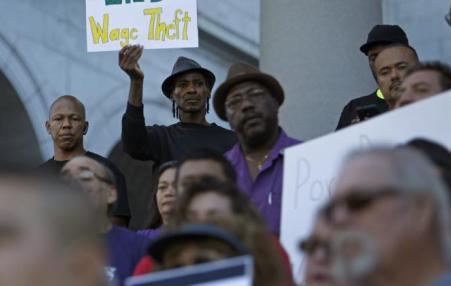The Migrant Workers Who Follow Climate Disasters
The New Yorker
 Los Angeles is the wage theft capital of the United States. Workers here lose $26 million to wage theft every week according to the UCLA Labor Center. The crime has major impacts on local economies. It decreases taxable income, lowers wage standards, and in California alone is estimated to cost the state $7 billion in lost payroll taxes.
Los Angeles is the wage theft capital of the United States. Workers here lose $26 million to wage theft every week according to the UCLA Labor Center. The crime has major impacts on local economies. It decreases taxable income, lowers wage standards, and in California alone is estimated to cost the state $7 billion in lost payroll taxes.
Spread the word